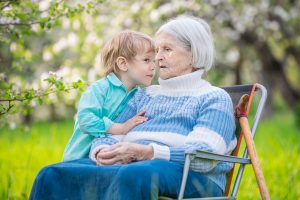 Dealing with a diagnosis of Alzheimer’s disease or dementia is a challenge for both the patient and their loved ones. But even as you and your loved ones learn to come to terms with the diagnosis, don’t forget to keep the children in your life involved. While you may feel an impulse to protect children from the situation, trying to hide the truth could make things worse.
Dealing with a diagnosis of Alzheimer’s disease or dementia is a challenge for both the patient and their loved ones. But even as you and your loved ones learn to come to terms with the diagnosis, don’t forget to keep the children in your life involved. While you may feel an impulse to protect children from the situation, trying to hide the truth could make things worse.
Children are often keenly aware when adults around them are experiencing difficulty or stress. If they don’t understand the reason for this, they may become afraid or believe it to be their fault. They could also become resentful or angry if they feel they are not being told the truth about matters.
Of course, what and how much you tell a child about dementia will depend on their age, their personal closeness to the person diagnosed, and their ability to cope with the information. But it is important to let them know they are included in the discussion and that they can ask questions and share their feelings. Explaining the situation and letting the child know what can be expected as the disease progresses can help them understand that some behavioral changes are part of the illness and not directed at them.
Do let the child know they can ask questions, and that it is okay to feel worried or sad. But be careful not to impose an adult caregiver role on a child. If a child expresses a desire to be helpful, let them know what simple things they can do to help. Sometimes just being present, listening or going for a walk can be extremely meaningful.
Here are some resources to help children cope with a loved one’s dementia diagnosis:
The Alzheimer’s Society provides guidance on how to talk to young people about dementia.
When Dementia is in the House is a website for kids which includes advice from other kids, tips on self-care, how to get help and much more.
